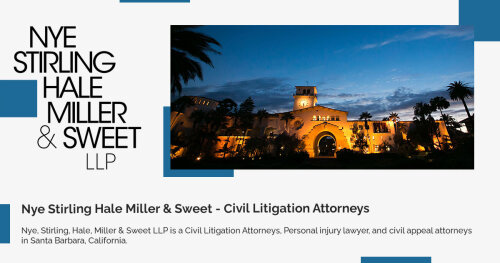Best Class Action Lawyers in California
Share your needs with us, get contacted by law firms.
Free. Takes 2 min.
Or refine your search by selecting a city:
List of the best lawyers in California, United States
About Class Action Law in California, United States
Class action law in California allows a group of people with similar claims or injuries to collectively bring a lawsuit against a defendant. This legal process is intended to make it more efficient for people to seek justice, especially when individual claims might be too small to pursue separately. California is recognized for having a robust legal framework that supports the filing and management of class actions, which can involve a wide range of issues such as consumer rights violations, employment disputes, defective products, and privacy breaches.
Why You May Need a Lawyer
Class actions can be complex and often require seasoned legal expertise. You might need a lawyer if you believe you and others have suffered harm from a business or organization. Common scenarios include being overcharged or misled by a company, experiencing discrimination or wage violations at work, dealing with faulty products, or having your data compromised. Lawyers can advise you on whether your case qualifies for a class action, help organize impacted individuals, handle court filings, navigate negotiations for settlements, or take your case to trial if needed.
Local Laws Overview
California has its own set of procedural rules for class actions, which are detailed in the California Code of Civil Procedure sections 382 and 1780-1784, as well as in relevant case law. Key aspects include:
- To proceed as a class action, plaintiffs must show that there is a well-defined group with common legal or factual claims.
- The class representative must have claims typical of the group and be able to fairly protect the interests of all members.
- California courts rigorously review the suitability of class actions to ensure that they are the best method for resolving disputes efficiently and fairly.
- There are specific rules for notifying potential class members and for distributing any settlements or awards.
- Both state and federal courts in California hear class action cases, and sometimes cases may get moved between the two systems.
These rules are designed to ensure fairness and consistency while allowing groups with a shared grievance to pursue remedies together.
Frequently Asked Questions
What is a class action lawsuit?
A class action lawsuit is a legal case where a group of people with similar injuries or claims sues a defendant together as one group, rather than as individual plaintiffs.
Who can start a class action in California?
Any individual who has suffered harm similar to a larger group can serve as a class representative and file on behalf of all members with the court’s approval.
What types of cases qualify for class actions?
Common class actions in California involve consumer protection, employee wage and hour violations, defective or dangerous products, privacy breaches, and false advertising.
How do I know if I am part of a class action?
If a class is certified, potential members are usually notified by mail, email, or public notices. You may join the class, opt out, or sometimes take no action to be included.
Do I have to pay any money to participate?
Class actions typically operate on a contingency fee basis, meaning you pay nothing upfront. If the case succeeds, attorney fees are usually deducted from the settlement or award.
Can I be excluded from a class action?
Yes, you may choose to opt out if you receive notice, which preserves your right to file your own lawsuit over the same issue.
How long do class action lawsuits take?
Class actions can last from several months to several years depending on complexity, the volume of evidence, and whether the case settles or goes to trial.
What are the benefits of a class action?
Class actions allow people with similar claims to pool resources, making it easier and more affordable to seek justice. They can also help address widespread harms more efficiently.
What outcomes can result from a class action?
Possible outcomes include monetary compensation, changes to business practices, refund offers, or other remedies directed by the court.
Do I need a lawyer to join a class action?
Although you are not required to hire your own lawyer if you are a class member, consulting with an attorney can help you understand your rights and options, especially if you are considering opting out or starting a separate claim.
Additional Resources
For individuals seeking more information or guidance on class action matters in California, the following resources can be helpful:
- California Courts - Self-Help resources for civil cases
- California Department of Justice - Consumer Protection Section
- State Bar of California - Lawyer Referral Service
- Legal Aid organizations in your local county
- The United States District Courts for the Northern, Eastern, Central, and Southern Districts of California
- Consumer advocacy groups focused on class action alerts
Next Steps
If you believe you may have a claim that could be pursued as a class action, consider taking the following steps:
- Gather all documentation relevant to your claim, such as receipts, contracts, emails, or product information.
- Write down the details of your situation, including dates, affected parties, and any efforts you have already made to resolve the issue.
- Contact a qualified attorney who specializes in class action law in California. Many offer free consultations to help assess your case.
- Stay informed about ongoing class actions in California by checking court websites and consumer protection outlets.
- Consider your goals, such as potential compensation or policy changes, so you can communicate your priorities when seeking legal advice.
Remember that class action lawsuits follow specific timelines, so acting promptly ensures you understand your rights and can participate effectively.
Lawzana helps you find the best lawyers and law firms in California through a curated and pre-screened list of qualified legal professionals. Our platform offers rankings and detailed profiles of attorneys and law firms, allowing you to compare based on practice areas, including Class Action, experience, and client feedback.
Each profile includes a description of the firm's areas of practice, client reviews, team members and partners, year of establishment, spoken languages, office locations, contact information, social media presence, and any published articles or resources. Most firms on our platform speak English and are experienced in both local and international legal matters.
Get a quote from top-rated law firms in California, United States — quickly, securely, and without unnecessary hassle.
Disclaimer:
The information provided on this page is for general informational purposes only and does not constitute legal advice. While we strive to ensure the accuracy and relevance of the content, legal information may change over time, and interpretations of the law can vary. You should always consult with a qualified legal professional for advice specific to your situation.
We disclaim all liability for actions taken or not taken based on the content of this page. If you believe any information is incorrect or outdated, please contact us, and we will review and update it where appropriate.
Browse class action law firms by city in California
Refine your search by selecting a city.
















